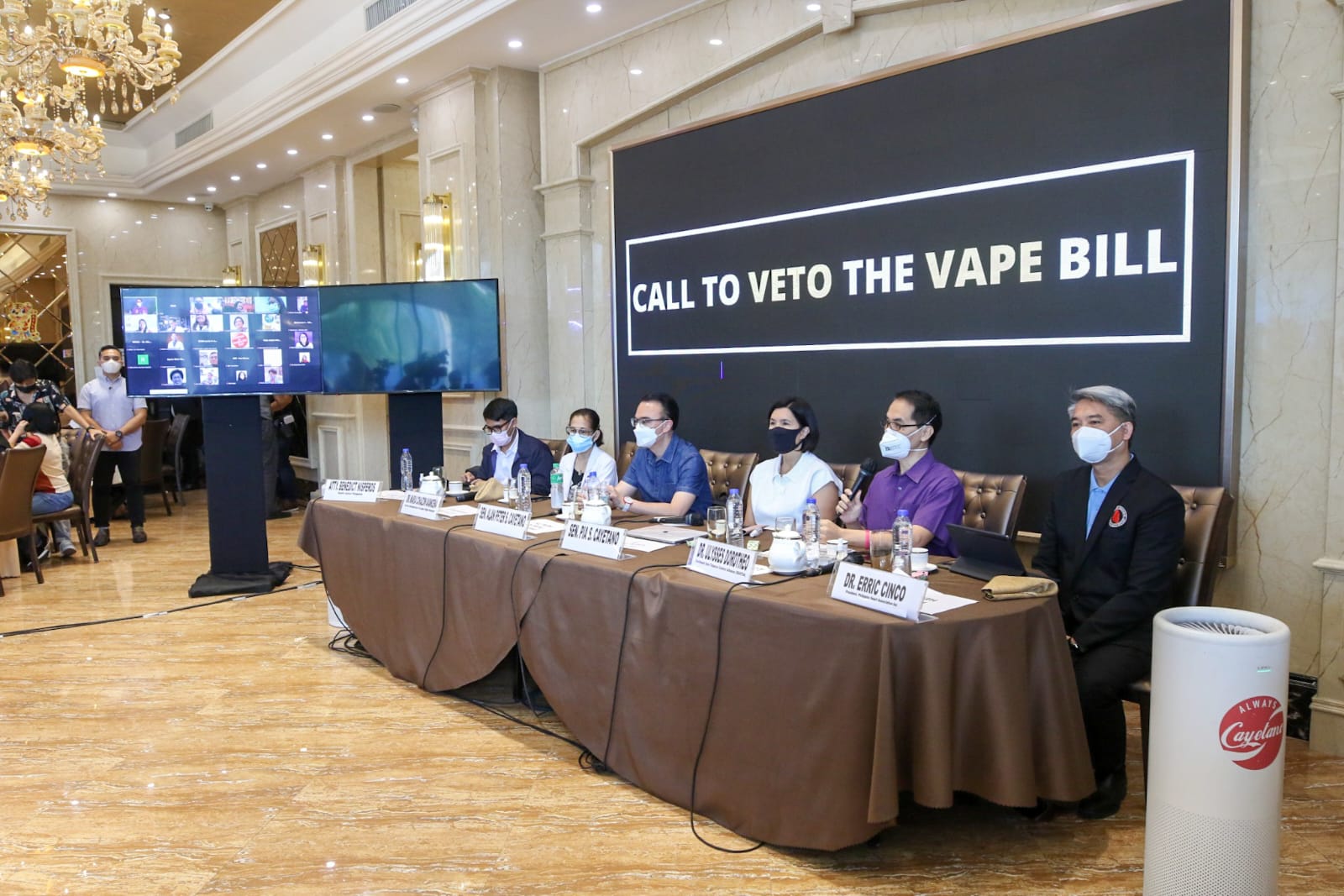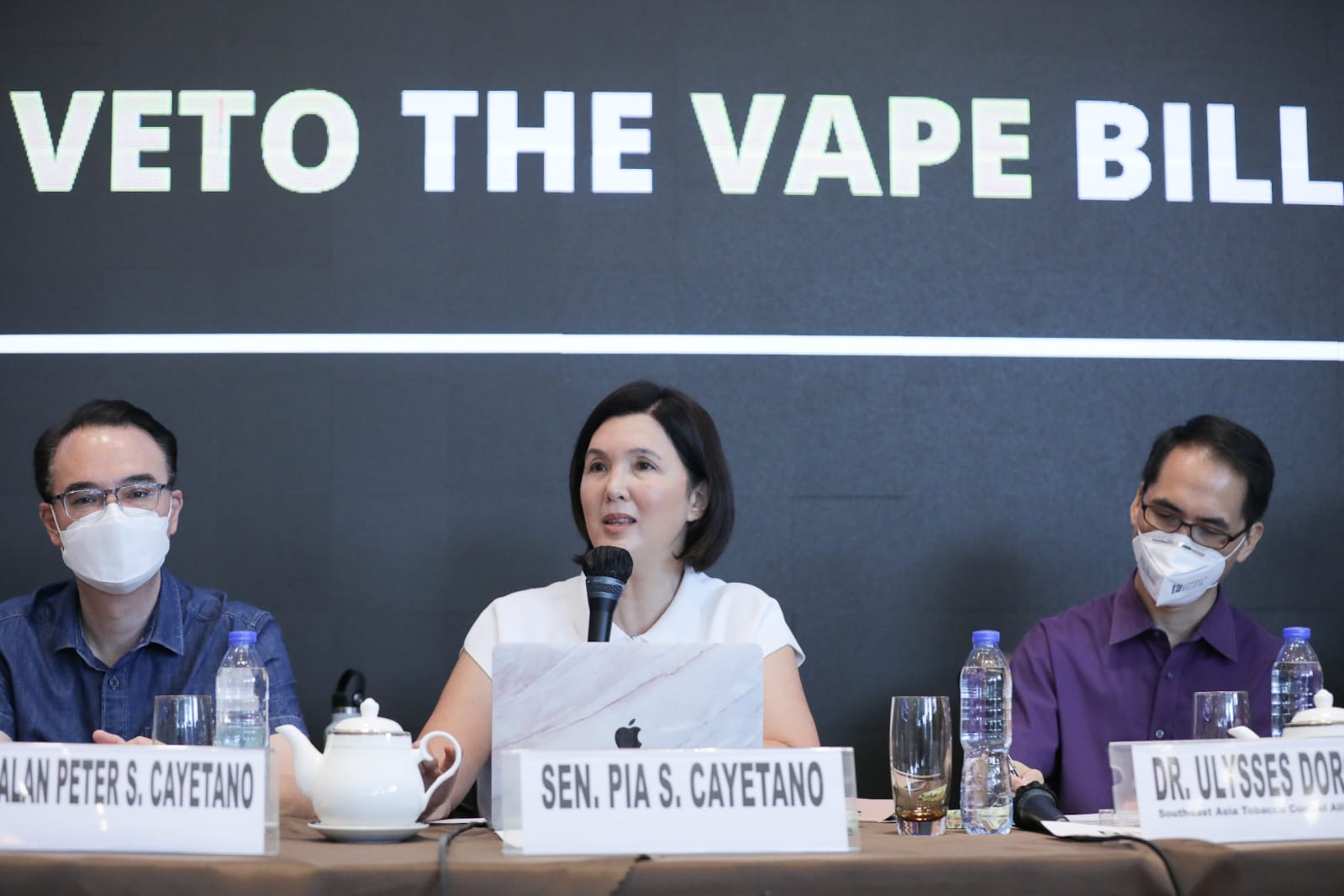20 July 2022
H.E. FERDINAND R. MARCOS, JR.
President, Republic of the Philippines
Malacañang Palace, Manila
Your Excellency:
I am submitting this letter ad cautelam to raise substantial and procedural issues arising from the enrolled bill of the “Vaporized Nicotine and Non-Nicotine Products Regulation Act,” also referred to as the “Vape Bill.”
The Vape Bill was approved by the 18th Congress, which had its final adjournment on 31 May 2022. [1] The term of its members, both from the House of Representatives and twelve of the members from the Senate, had also ended on 30 June 2022, the same time President Rodrigo R. Duterte’s term as President ended.
Because President Duterte neither affixed his signature to the enrolled bill of the Vape Bill, nor exercised presidential veto over the same, before his term ended, we are placed in a legal quandary of having a bill passed by a Congress, composed of different members, that has been
rendered functus officio by its final adjournment, and submitted to the President whose term has ended, being signed into law by a new President. This would create a serious constitutional issue on the validity of a “law” enacted by a Congress without official authority.
As a health advocate, lawyer, and member of Congress, I am of the sentiment that we should avoid technicalities such as these as much as possible, when courts would be constrained to rule on the laws that we make.
Even setting the procedural and possible constitutional issues aside, I believe that Your Excellency should veto the Vape Bill based on the detrimental effects it would have on the health of our fellow Filipinos, as warned by medical associations and health advocates, former DOH secretaries, and concerned government agencies – Department of Health (DOH), Food and Drug Administration (FDA), Department of Finance (DOF), and Department of Education (DepEd). These hazards are apparent from the changes the Vape Bill will bring about in our legal and regulatory framework on the industry of vapes and Heated Tobacco Products (HTPs), as further discussed below.
The proponents of the Vape Bill anchor their position on: (1) vapes and HTPs as being effective cessation tools from cigarette smoking; and (2) the need to regulate the industry.
However, these arguments are fatally flawed because rather than to regulate, the Vape bill actually removes the protective measures already found under Republic Act No. 11467 or the “Sin Tax Reform Act of 2020,” which was enacted into law last 22 January 2020.
The Vape Bill overturns the following key safeguard provisions of the Sin Tax Reform Act, which provided stricter regulations on the products to protect public health:
1) The jurisdiction to regulate vapes and HTPs will be transferred from the FDA to the Department of Trade and Industry (DTI).
It is incomprehensible how the DTI would perform the task of determining the safety of the products that will be on the market. By its very mandate, it is the FDA that has the power and the expertise to regulate this industry.
As a point of reference, the US FDA rejected 55,000 flavored e-cigarettes due to lack of evidence that they have a benefit to adult smokers sufficient enough to overcome the public health threat posed by the alarming levels of youth use of such products. [2]
DTI does not have the mandate and the expertise to determine the health effects of any product, let alone these sin products, which are detrimental to public health.
In fact, vape and HTP users will benefit with the FDA as the regulatory agency, as they will be assured that these products have undergone the appropriate tests based on scientific evidence and established health standards.
2) The prohibition to sell to persons below the age of 21 will be lowered to 18 years old. This means that even our senior high school students will have access to vapes and HTPs. The latest available data from the DepEd would show that there are 1,184,663 learners in senior high and 238,935 learners in junior high, who are at least 18 years old as of SY 2020-2021. By lowering the minimum age of access to vapes from 21 to 18 as mandated by the Vape Bill, the government would send the message to around 1.4 million junior
and senior high school students that it is alright to get hooked on vaping.
Studies have also shown that the brain continues to mature until the age of 25 and that early exposure to nicotine, through vapes and HTPs, could impair the brain’s development. [3]
3) More flavors are allowed, instead of just plain tobacco and plain menthol, which will make these sin products more appealing to the youth.
Vapes and HTPs are being marketed to attract younger people, some of whom have never even smoked a cigarette in their life.
On Regulation vs Ban and Revenue Collection
As a background, Congress had already settled the issue on whether to impose a total ban or to regulate vapes and HTPs during the deliberations on the Sin Tax Reform Act.[4] Both Houses agreed to regulate these sin products by institutionalizing the three (3) aforementioned
crucial protective measures under the said law.
Thus, the government wins by being able to collect much needed revenues from sin taxes, while at the same time minimizing the appeal of the products to the youth with the 21-year age requirement and the limitation of flavors, and it also ensures that there is proper regulation by the FDA.
On the other hand, lowering the minimum age of access to 18 years old will entail more problems for the country in the future. The youth and the next generations after them are possible casualties of vape- and HTP-related diseases. Simply put, the Vape Bill would further increase the cost of related diseases brought about by these products in the Philippines.
International Developments
It is shocking, to say the least, if we consider how differently the United States (US) is addressing the vape pandemic. The US FDA placed Juul’s application for its electronic cigarettes under “additional review.” In order to remain on the market, Juul must prove that their e-cigarettes benefit public health. On the other hand, here in the Philippines, the Vape Bill will allow the relaxation of health protective measures that are already provided under the Sin Tax Reform Act.
If there is one thing this pandemic has taught us, it is the importance of listening to science and the experts when it comes to protecting people’s health. If passed into law, the Vape Bill that is masquerading as a health bill will not only overturn important provisions under the Sin Tax Reform Act, but it will also open the doors for younger people to use these products, and practically encourage such practice in the guise of regulation.
I thus reiterate my urgent call and echo the appeal of more than sixty (60) medical associations and health advocates, former DOH secretaries, and concerned government agencies – DOH, FDA, DOF, and DepEd – to veto the Vape Bill.
We need to listen to health experts on the need to properly regulate vapes and HTPs as these products contain harmful chemicals that affect people’s health. This “regressive measure” goes against all the gains our country has made on tobacco and vape control. In fact, the Vape Bill does not regulate, but actually loosens crucial safeguards and makes these products more available to younger individuals.
Mr. President, I strongly urge you to VETO THE VAPE BILL.
[signed]
PIA S. CAYETANO

End notes:
[1] The Vape Bill was passed by both Houses on 26 January 2022, and was officially transmitted to Malacañang by the House of Representatives just this 24 June 2022, or five (5) months after its passage and barely three (3) working days before the end of former President Duterte’s term.
[2] FDA Denies Marketing Applications for About 55,000 Flavored E-Cigarette Products for Failing to Provide Evidence They Appropriately Protect Public Health (2021, August 6). US FDA. https://www.fda.gov/news-events/press-announcements/fda-denies-marketing-applications-about-55000-flavored-e-cigarette-products-failing-provide-evidence
[4] Cayetano, P. S. (2019, September 30). “Excise Tax on Alcohol Products.” Philippines. Senate of the Philippines. 18th Congress, 1st Regular Session.
https://janus.senate.gov.ph/go/http://vesta/legis/plenary/Documents/Transcripts/18th%20Congress%20(1st%20Regular%20Session)/TSN%20SEPT


Leave a Reply